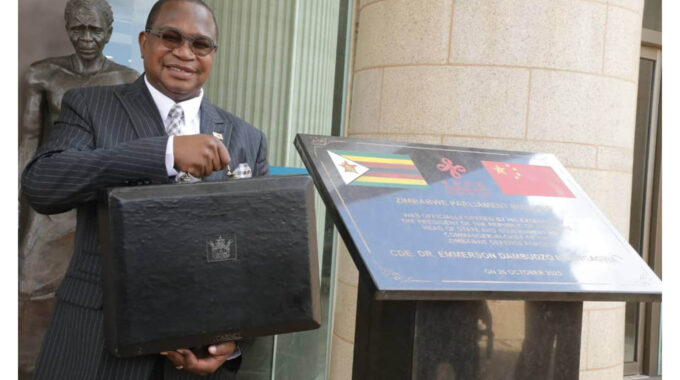2025 National Budget to balance the economy, Mthuli
FINANCE, Economic Development and Investment Promotion Minister, Professor Mthuli Ncube, says the 2025 national budget intends to balance the economy and build the necessary resilience that the economy needs to survive a myriad of shocks.
He said this while addressing delegates at the Post-Budget Breakfast Meeting, which was organised by Business Weekly in partnership with the Confederation of Zimbabwe Industries (CZI) and the Ministry of Finance, Economic Development and Investment Promotion.Zimbabwe car imports
Mthuli outlined the key objectives and allocations within the budget.
A notable aspect of the budget is the allocation of approximately 11 percent of its total resources to the agricultural sector, reflecting a strong commitment to ensuring food security within the nation.
The Minister underscored that citizens dependent on the agricultural sector should expect maximum support with initiatives that include investment in irrigation to build that resilience.
This initiative is part of a broader strategy to enhance the performance of the sector, allowing it to better cope with unpredictable climatic and economic challenges.
In addition to agriculture, the budget aims to foster the growth of new industries to create a more diversified economic landscape.
To facilitate this, the budget proposes the establishment of a development fund, which will be jointly managed by the Ministry of Finance, Economic Development, and Investment Promotion, alongside the Ministry of Industry and Commerce.
This fund is projected to catalyse investments in key sectors, including pharmaceuticals and automobile manufacturing, among others deemed appropriate for investment, as a means to propel the economy forward.
The Minister enunciated his intention to provide incentives for local manufacturing, particularly in the automotive sector, which includes cars and buses.
This initiative is part of a larger effort to stimulate local industry and reduce reliance on imports.
According to the Minister, some resources within the budget will be dedicated to advancing the devolution agenda, ensuring equitable development across all regions, and preventing any demographics or areas from being overlooked in the nation’s development plans.
Addressing the delegates, Mthuli emphasised that the goal of the budget is to strike a balance across various sectors while focusing on building economic resilience as a priority.
“The budget is meant to balance the economy, to build the resilience that the economy needs to survive the shocks. If you look at the agricultural sector, we have almost 11 percent of the budget having been earmarked for that sector to ensure that there is food security. So, our citizens who are living off food sector, should expect maximum support, particularly through investment in irrigation to build that resilience.
“Looking at industry, we would want to grow new industries and balance the economy. So, we are proposing that we set up some kind of development fund, which originally was sitting with IDC, but now will be housed between the Ministry of Finance and Industry and Commerce, so that we can invest in the pharmaceutical sector and car manufacturing sector and whatever sectors that the protagonists see fit, that we should invest in order to drive the economy forward.
“I really believe that we have tried hard to balance things out. Of course, I have selected a few things in my answer, but the idea is to balance out the economy, but above all, build the resilience that the economy requires.,” said Mthuli said.
Mthuli indicated that the Government is contemplating the strategic disposal of a range of state assets to generate revenue necessary for funding crucial programmes, including those connected to agriculture, food security, infrastructure development, the health sector and education.
He pointed out that proceeds from some disposals would also be allocated toward offsetting national debt, acknowledging the pressing need to manage interest payments effectively.
“The issue of debt is critical, it is an albatross that needs to be moved from our necks so that the economy can move forward. It is something that occupies me for quite a lot of time.”
However, the Minister expressed concern regarding the declining global demand for hard commodities within the mining sector—a critical component of Zimbabwe’s exports, accounting for over 60 percent of total export earnings.Zimbabwe car imports
Mthuli highlighted the potential implications of waning demand, particularly from China, which plays a significant role in driving the demand for local mineral exports.
While Mthuli pronounced the positive performance of gold this year, he noted that the price trends for other essential minerals, such as lithium, palladium and platinum, have been lacklustre in recent months, presenting challenges for the mining sector’s overall contribution to the economy.
On the environmental front, the budget also includes provisions for green initiatives, such as implementing taxes on plastic carrier bags, similar to policies adopted by other countries that have opted to ban such items entirely.
Mthuli noted that he had previously resisted outright bans on plastic bags, opting instead for a systematic taxation approach to avoid stifling local industries that rely on this packaging.
He noted that some of the progressive taxes included in the budget, such as those targeting unhealthy foods, are part of a broader strategy aimed at promoting healthier living among the populace.-ebsinessweekl











